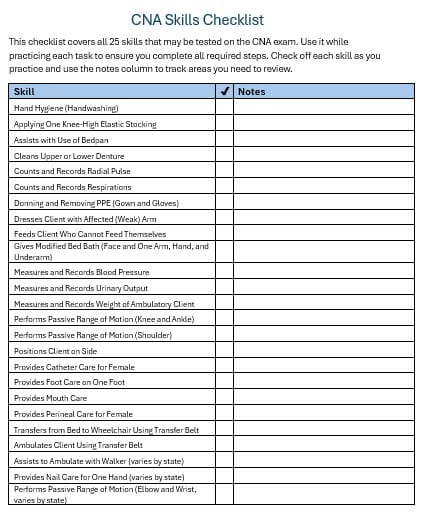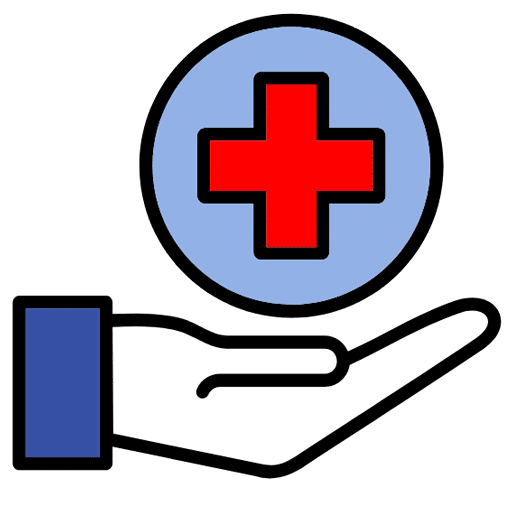If you’re thinking about becoming a Certified Nursing Assistant (CNA), you’re probably wondering one thing: How do I pass the CNA test on the first try?
The CNA exam is a gateway into a healthcare career that’s stable, rewarding, and growing every year. For many people, it’s the first step toward becoming a nurse, medical assistant, or another professional in the medical field. Passing the CNA exam not only proves you’re ready to care for patients but also sets you up for immediate job opportunities in hospitals, nursing homes, and home health care.
In this guide, we’ll walk you through everything you need to know about preparing for the CNA written exam and the CNA skills test. You’ll learn the best CNA exam tips, study resources, practice strategies, and mindset shifts to help you succeed on the first attempt.
What Is the CNA Exam?

The CNA certification test is made up of two parts:
- The Written (or Oral) Exam – Usually 60–70 multiple-choice questions covering CNA knowledge like basic nursing skills, infection control, communication, and patient rights.
- The Skills Exam – A hands-on demonstration where you’ll perform 3–5 randomly selected skills from the CNA skills test checklist (such as handwashing, taking vital signs, or assisting with mobility).
Each state has its own CNA test requirements, but the format is similar across the country. You must pass both sections to earn your certification and become eligible to work as a CNA.
Why Passing on the First Try Matters
Failing the CNA exam doesn’t end your career, but it does mean:
- You’ll have to pay to retake the test (fees can range from $80–$150 per attempt).
- It may delay your job start date.
- Some states only allow a limited number of retakes before you have to repeat training.
Passing on the first try shows future employers that you’re well-prepared, reliable, and serious about your career in healthcare. Plus, it boosts your confidence as you enter the workforce.
Step 1: Understand What’s on the CNA Exam
Before you can pass, you need to know what you’ll be tested on. The CNA exam covers several major areas:
- Basic Nursing Skills – Taking vital signs, positioning patients, recognizing normal vs. abnormal symptoms, and ensuring safety.
- Activities of Daily Living (ADLs) – Helping patients eat, bathe, dress, toilet, and move safely.
- Infection Control – Proper handwashing, wearing PPE, preventing cross-contamination.
- Communication Skills – Talking with patients, families, and the healthcare team.
- Legal & Ethical Behavior – Maintaining confidentiality, professional boundaries, and understanding scope of practice.
- Restorative Skills – Encouraging independence and assisting with rehab exercises.
- Client Rights – Respecting dignity, privacy, and autonomy.
- Emotional, Mental, and Spiritual Needs – Cultural awareness, empathy, and mental health support.
- Member of the Healthcare Team – Knowing your role as a CNA and how it fits into the broader care team.
👉 Pro Tip: Download a CNA study guide for your state. It will outline the exact test topics and skills you need to know.
Step 2: Create a CNA Test Prep Plan 💡
Don’t just “wing it.” The CNAs who pass on the first try usually have a clear study plan. Here’s how to build yours:
1. Start Early
Give yourself at least 2–4 weeks of study time after completing CNA training. Review daily, even if it’s just 30 minutes.
2. Break It Into Sections
Focus on one topic at a time—such as infection control today, basic nursing skills tomorrow. This prevents overwhelm.
3. Use Multiple Study Methods
- Read through your CNA textbook or state-provided handbook.
- Take a CNA practice test online to identify weak areas.
- Use CNA exam flashcards for quick review of key terms and steps.
4. Schedule Skills Practice
If possible, practice hands-on skills in a lab setting or with classmates. For example, take turns being the “resident” and the CNA to get used to patient care scenarios.
Step 3: Master the Written CNA Exam
The written CNA exam is where test anxiety often kicks in. Here’s how to crush it:
Practice With Realistic CNA Test Questions
The best way to prepare is by using CNA practice tests that mirror the actual exam format. Timed quizzes teach you how to pace yourself and get comfortable with multiple-choice wording.
Learn Test-Taking Strategies
- Read every question carefully—watch out for words like “always” or “never.”
- Eliminate obviously wrong answers first.
- If unsure, make the most educated guess you can—there’s no penalty for guessing.
Review High-Yield Topics
Some topics show up over and over again: vital signs, infection control, patient safety, and client rights. Make sure you know these inside and out.
Step 4: Pass the CNA Skills Test Checklist
The skills exam is where nerves often cause mistakes. Here’s how to prepare:
Know the Steps Exactly
Each skill (like handwashing or transferring a patient from bed to wheelchair) has a specific checklist that examiners use. Missing steps can cost you points—even if the patient is safe.
Practice in Real Time
Don’t just read the steps—do them out loud. Pretend you’re in the test room and go through the motions.
Prioritize Key Skills
Some skills, like handwashing, are considered “critical.” Mess these up and you automatically fail. Practice them daily until they feel automatic.
Communicate During Skills
Examiners want to see you interacting with the patient: explaining what you’re doing, checking comfort, and respecting privacy. Treat the mannequin or volunteer like a real patient.

Step 5: Use CNA Exam Tips From Successful Candidates
Here are proven CNA exam tips from past test-takers:
- Arrive early so you’re not rushed.
- Bring two forms of ID and required materials.
- Wear scrubs to get into the mindset.
- Stay calm—take a deep breath if you feel nervous.
- Double-check your work on written questions.
- Don’t panic if you mess up a step in the skills exam. Correct yourself and keep going—many small mistakes are allowed.
Step 6: Avoid Common Mistakes That Cause Fails
Many CNA candidates fail for preventable reasons. Watch out for:
- Forgetting hand hygiene at the beginning and end of every skill.
- Skipping “privacy” (closing a curtain or door before care).
- Not placing the call light within reach.
- Ignoring patient communication.
- Running out of time on the written exam.
If you drill these basics, you’ll avoid the most common pitfalls.
Step 7: Build Confidence and Mindset
Passing the CNA exam isn’t just about knowledge—it’s about confidence.
- Visualize success—picture yourself completing each skill perfectly.
- Stay positive—remind yourself why you want to become a CNA.
- Don’t compare yourself—focus on your own preparation.
Remember, examiners want you to succeed. They’re checking for safety, accuracy, and compassion—not perfection.
Bonus: Resources for CNA State Exam Preparation
To make your prep smoother, here are some must-use tools:
- CNA Study Guide – Organized notes covering each section of the test.
- CNA Practice Tests Online – Timed quizzes to simulate the exam.
- CNA Exam Flashcards – Quick reviews for vocabulary, procedures, and patient rights.
- Skills Videos – Step-by-step demonstrations of each skill from the checklist.
You’ve Got This

The CNA exam may seem intimidating, but with the right CNA test prep plan, practice tests, and skills review, you can pass on the first try and start working in healthcare right away.
For many young people, becoming a CNA is the first step toward a lifelong career in medicine. Whether you go on to become an LPN, RN, or stay in the CNA role, passing this test is your ticket to real-world experience and helping people who need care.
So grab your CNA study guide, set up a consistent practice schedule, and keep your goal in mind: pass the CNA exam on your first try—and launch your career in healthcare.
